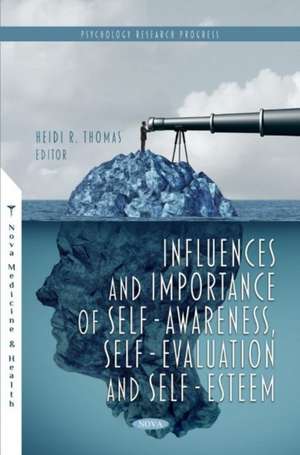Influences and Importance of Self-Awareness, Self-Evaluation and Self-Esteem
Editat de Heidi R. Thomasen Limba Engleză Paperback – 20 apr 2022
Preț: 558.71 lei
Preț vechi: 648.75 lei
-14% Nou
106.92€ • 110.99$ • 89.16£
Carte disponibilă
Livrare economică 03-17 martie
Specificații
ISBN-10: 1685075282
Pagini: 173
Dimensiuni: 155 x 230 mm
Greutate: 0.25 kg
Editura: Nova Science Publishers Inc
Colecția Nova Science Publishers Inc
Cuprins
Preface; Acknowledgments; Introduction to the Second Edition; Humanism Principles Relevant to Psychiatric Care; The Biology Principle; What is in a Name?; A Humanist Model for the Practice of Psychiatry: A Proposal to Facilitate Assimilation of New Knowledge; A Proposed New System of Integrated Psychiatric Care with Prevention, Primary Care, General Psychiatry Practice, Specialization and Sub-Specialization: From Pre-Conception to Terminal Care; Should Psychiatry be a Separate School from Medicine?; Psychiatric Education; Research in Psychiatry; Personality Disorders; Drug and Alcohol Use Disorders; Correctional Psychiatry; Developmental Intellectual Disabilities: Formerly Mental Retardation; Stigma; Afterthoughts; About the Author; Index.
Descriere
Self-esteem forms a critical component of mental health, as an absence of self-esteem is associated with mental disorders like depression. As such, understanding the nature and meaning of self-esteem and related phenomena like self-perception is essential for treatment of a variety of mental illnesses. Chapter One utilizes terror management theory to explain what self-esteem is, how the need for self-esteem develops, how people attain and maintain self-esteem, and why self-esteem is so important for psychological well-being. Chapter Two demonstrates how self-esteem is the fundamental mental attitude that provides the qualities necessary to perform democracy and reject authoritarian threats. Chapter Three deals with the definition of self-awareness, the description of the neural substrates that have been associated with it, and the examination of an interpretive neuroanatomical model of the phenomenon, with a focus on neurological and neuropsychological diseases. Chapter Four advocates a culture of self-evaluation as part of academic and professional culture through critical reflection on teaching and the results of one's own work. Chapter Five analyzes self-concept as a predictor of the academic self-efficacy perceived by adolescents. Lastly, Chapter Six studies the relationship between testosterone levels and self-esteem in school-age boys and girls.
